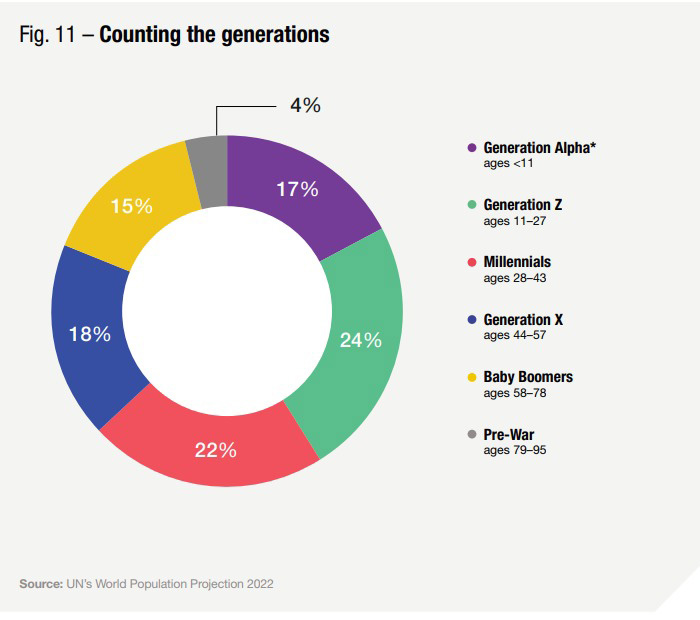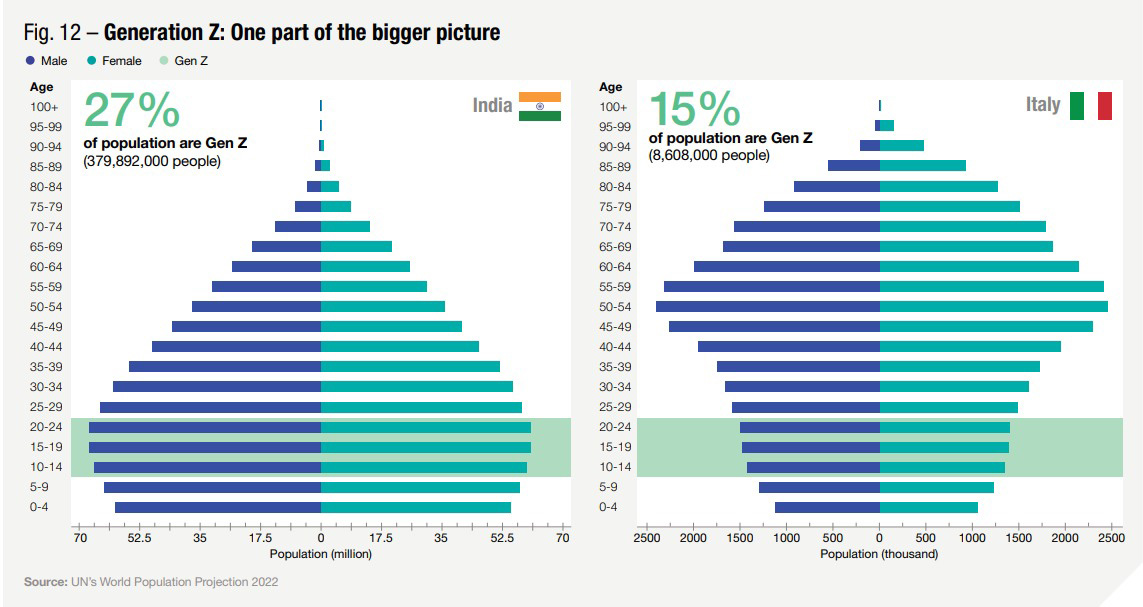

We need to talk about generations – Generation questions
 As we compiled this report, we’ve been identifying some of the questions we need to ask ourselves when we are talking about generations.
As we compiled this report, we’ve been identifying some of the questions we need to ask ourselves when we are talking about generations.
This is by no means an exhaustive list but sets out some of the lines of enquiry we believe can help us all develop a more rounded understanding of generational and demographic analysis – whether we are thinking about brands, about categories/sectors or about public services.
 Do we know enough about how to market to the over 50s?
Do we know enough about how to market to the over 50s?
They are a consumer, customer and citizen group that cannot be ignored, both in terms of size and resources. As we show in our Korea analysis, personal income among seniors doubled between 2008 and 2020. In Italy, 24% of the population is now aged over 65. But what will work for my organisation, in our specific context? For my category or brand, do we need to target or communicate them in a particular way, or not?
 What order of importance should we give to Generation Z?
What order of importance should we give to Generation Z?
 The answer is likely to differ from country to country (as the examples below from Italy and India show), and from category to category. But even in India, with its still relatively young population profile, Generation Z are only part of the story. If Gen Z or even Gen Alpha is code for talking about young, emerging, pliable consumers/ customers, we need to remind ourselves that, in many countries, there will be fewer of them coming on stream during the coming decades.
The answer is likely to differ from country to country (as the examples below from Italy and India show), and from category to category. But even in India, with its still relatively young population profile, Generation Z are only part of the story. If Gen Z or even Gen Alpha is code for talking about young, emerging, pliable consumers/ customers, we need to remind ourselves that, in many countries, there will be fewer of them coming on stream during the coming decades.
 What are the specific dynamics of the different Generations in my country?
What are the specific dynamics of the different Generations in my country?
In India, our analysis of Generation Z takes us beyond the big urban sectors, as we explore how tech companies are now focusing more of their campaigns on Bharat (small-town India). Meanwhile, in South Korea, we looked at how Generation X were the first “post-democratisation” grouping.
companies are now focusing more of their campaigns on Bharat (small-town India). Meanwhile, in South Korea, we looked at how Generation X were the first “post-democratisation” grouping.
 Just what’s happening with the Millennials?
Just what’s happening with the Millennials?
 Are they the “screwed generation”, hard-done-by and struggling financially, as they find it harder and harder to buy houses, raise children and rise to the top of organisations. As the spotlight turned towards Generation Z, we need to ask ourselves whether we have the evidence we need to really understand Millennials now they are maturing - including where and when it makes sense to make generalisations about them. For example, it may be that younger millennials (in their late 20s) have very different attitudes or behaviours than do older millennials (in their late 30s). By grouping them together in a big block, our analysis may be losing some precision.
Are they the “screwed generation”, hard-done-by and struggling financially, as they find it harder and harder to buy houses, raise children and rise to the top of organisations. As the spotlight turned towards Generation Z, we need to ask ourselves whether we have the evidence we need to really understand Millennials now they are maturing - including where and when it makes sense to make generalisations about them. For example, it may be that younger millennials (in their late 20s) have very different attitudes or behaviours than do older millennials (in their late 30s). By grouping them together in a big block, our analysis may be losing some precision.
 Are Generation X about to take over the world?
Are Generation X about to take over the world?
Millennials at least had the place in the sun for a while. But people aged 43-58 years old lag behind the others when it comes to people paying attention to them as a distinct grouping or interesting cohort. Google Search finds five times as many enquiries for Millennials than about Gen X. But is this “forgotten generation” (accounting for just 10% of Google Search traffic when people are researching this topic) about come to the fore? Certainly, they have power, whether we are talking about business, cultural and, increasingly, political life. And they have resources: for example, in the US, they are the only group to regain the financial assets lost after the 2007 crash.
Are Millennials the “screwed generation”, hard-done-by and struggling financially, as they find it harder and harder to buy houses, raise children and rise to the top of organisations?
 Do the terms work for you?
Do the terms work for you?
 As we noted in our introduction, the terms being used were born in the USA, and – by using them uniformly across countries – it may actually hamper our analysis. The term Baby Boomer comes from a particular western perspective, describing the increase in the birth rate in the years immediately following the Second World War among the key combatants – most notably the US, the UK, Canada, Australia, New Zealand, France, Germany and Japan.
As we noted in our introduction, the terms being used were born in the USA, and – by using them uniformly across countries – it may actually hamper our analysis. The term Baby Boomer comes from a particular western perspective, describing the increase in the birth rate in the years immediately following the Second World War among the key combatants – most notably the US, the UK, Canada, Australia, New Zealand, France, Germany and Japan.
In this vein, the second part of our report is devoted to understanding more about how these themes play out on the ground. Through the lens of our six case study countries, our teams delve into the realities of the experiences of different generations, grounded in the context of the particular countries where they have lived their lives.
Table of content
- We need to talk about generations: Understanding generations - Foreword by Ben Page
- Introduction: Generation myths and demographic realities
- Context: Why generational analysis matters
- Peak population: Preparing for the fall
- A topic of conversation: How do people talk about generations?
- Generation questions: Issues to think about
- How to tell a myth from a reality in UK generations
- Western generational concepts don't apply in South Africa
- Why where you live matters in understanding generations in India
- Super-ageing in post-pandemic South Korea
- Population bust: How Italy is finally facing its grey rhino
- Mexico: from a teenage country to an adult one in a century
| Previous | Next |

![[Webinar] KEYS: THE MIDDLE CLASS: In Crisis?](/sites/default/files/styles/list_item_image/public/ct/event/2025-10/middle-class-family-dinner-food-carousel.webp?itok=iD1QyX8n)
![[Webinar] KEYS: Global Trends - The Uneasy Decade](/sites/default/files/styles/list_item_image/public/2025-09/image/minisite/keys0925.png?itok=3oAiYcxm)
